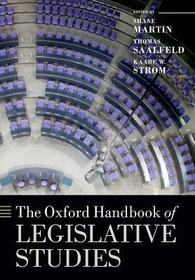
The Oxford Handbook of Legislative Studies
Series: Oxford Handbooks;
- Publisher's listprice GBP 36.99
-
17 671 Ft (16 830 Ft + 5% VAT)
The price is estimated because at the time of ordering we do not know what conversion rates will apply to HUF / product currency when the book arrives. In case HUF is weaker, the price increases slightly, in case HUF is stronger, the price goes lower slightly.
- Discount 10% (cc. 1 767 Ft off)
- Discounted price 15 904 Ft (15 147 Ft + 5% VAT)
Subcribe now and take benefit of a favourable price.
Subscribe
17 671 Ft

Availability
printed on demand
Why don't you give exact delivery time?
Delivery time is estimated on our previous experiences. We give estimations only, because we order from outside Hungary, and the delivery time mainly depends on how quickly the publisher supplies the book. Faster or slower deliveries both happen, but we do our best to supply as quickly as possible.
Product details:
- Publisher OUP Oxford
- Date of Publication 21 July 2016
- ISBN 9780198778493
- Binding Paperback
- No. of pages784 pages
- Size 244x171x40 mm
- Weight 1310 g
- Language English 0
Categories
Short description:
Legislatures are arguably the most important political institution in modern democracies. The Oxford Handbook of Legislative Studies, written by some of the most distinguished legislative scholars in political science, provides a comprehensive and up-to-date description and critical assessment of the state of the art in this key area.
MoreLong description:
Legislatures are political bodies essential to democracy and the rule of law. They present social scientists with numerous intriguing puzzles, with far-reaching implications for our understanding of political institutions. Why, and how, have these ancient assemblies, established in pre-democratic times, survived the transition to mass democracies? How have they adapted? How do they structure such processes as budgeting, legislation, and executive oversight? How do their members get selected, and what consequences flow from differences in these rules? What roles do committees and political parties play in contemporary legislatures? What functions do legislatures perform in autocratic, semi-democratic or recently democratized societies? What explains the similarities and differences in legislative rules, powers and recruitment? What are the policy and other consequences of variation in how legislatures are organized and function?
The 33 chapters in The Oxford Handbook of Legislative Studies, written by 47 of the most distinguished legislative scholars, provide a comprehensive and up-to-date description and assessment of the state of the art in legislative studies. Key themes explored include theoretical paradigms and methodological approaches to the study of legislatures, representation and legislative careers, internal organization, the role of parties within legislatures and the role of legislatures in policy making and accountability. The Handbook also explores the emergence of parliaments in historical and contemporary contexts, including new democracies and trans-national institutions.
This Handbook is fundamental reading for all scholars devoted to the study of political institutions, political parties and legislative studies.
Table of Contents:
Introduction
Part I: Theories
Formal Models of Legislatures
The Sociology of Legislatures and Legislators
Typologies and Classifications
Part II: Methods
Roll Call Analysis and the Study of Legislatures
Words as Data: Content Analysis in Legislative Studies
Debate and Deliberation in Legislatures
Interviews and Surveys in Legislative Research
The Experimental Study of Legislative Behavior
Part III: Representation and Legislative Careers
Candidate Selection: Implications and Challenges for Legislative Behavior
The Effect of Electoral Institutions on Legislative Behavior
Gender and Legislatures
Roles in Legislatures
Legislative Careers
Part IV: Organisation and Rules
Procedure and Rules in Legislatures
The Politics of Bicameralism
Committees
Part V: Parties in the Legislature
Political Parties and Legislators
Party Discipline
Legislative Party Switching
Legislative Institutions and Coalition Government
Part VI: Policy Making and Oversight
Institutional Foundations of Legislative Agenda Setting
Law Making
Legislatures and Public Finance
Legislatures, Lobbying and Interest Groups
Legislatures and Foreign Policy
Common Agencya Legislatures and Bureaucracies
Part VII: Expanding the Scope of Legislative Analysis
Political Behaviour in the European Parliament
Sub-National Legislatures
The Study of Legislatures in Latin America
Legislatures in Central and Eastern Europe
Authoritarian Legislatures
Reluctant Democrats and their Legislatures






